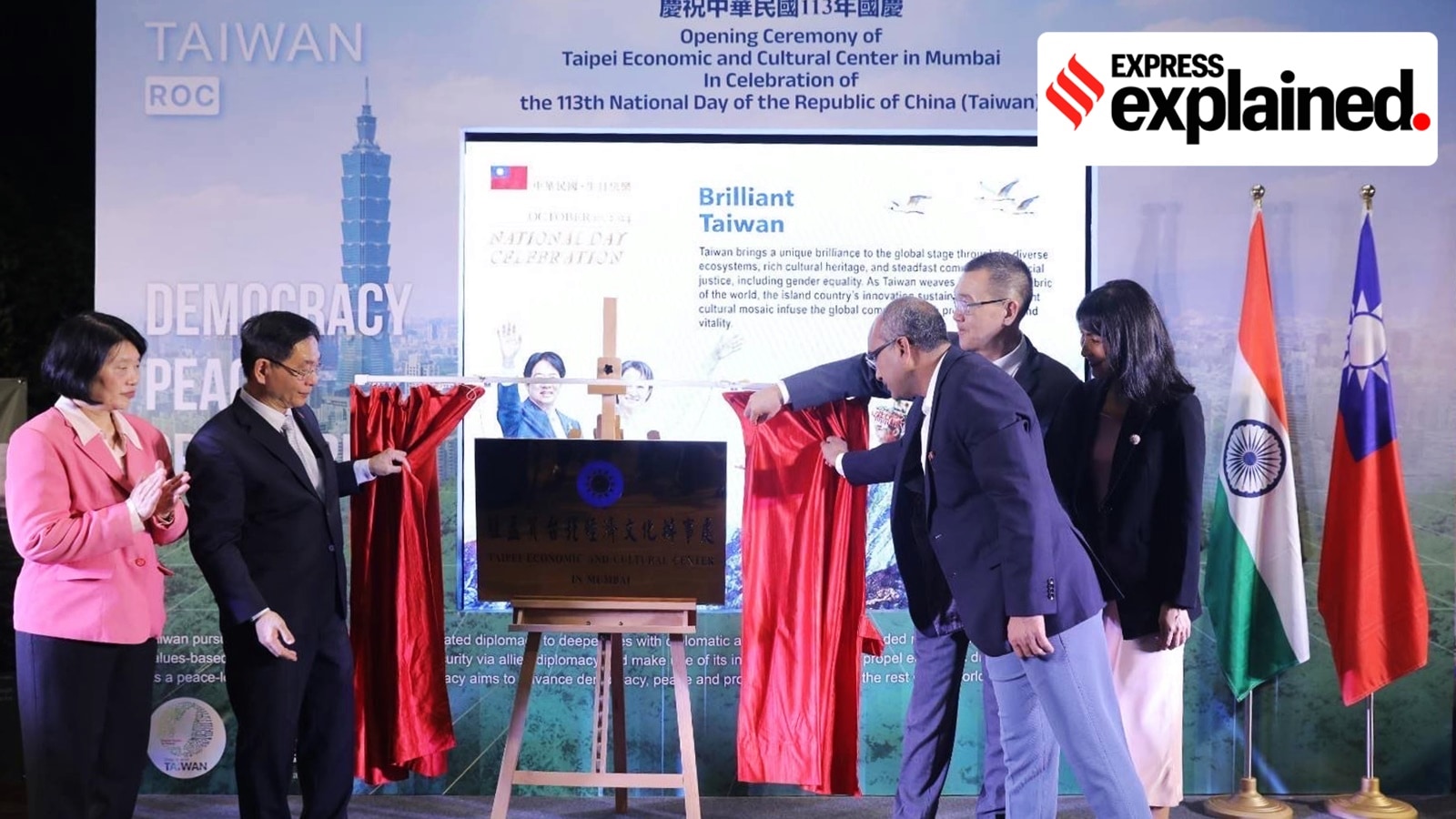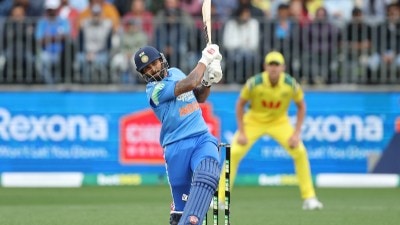China said it “lodged solemn representations” to India after the Government of Taiwan opened its Taipei Economic and Cultural Centre (TECC) in Mumbai last week.
At a press conference on Thursday (October 17), Foreign Ministry Spokesperson Mao Ning said China “strongly opposes all forms of official contact and interaction between Taiwan and countries having diplomatic relations with China, including the establishment of representative offices for each other.”

The TECC in Mumbai marks the Taiwan government’s third office in India after New Delhi (opened in 1995) and Chennai (opened in 2012). Why were these offices opened and why has China objected?
How China views Taiwan: What is the “One-China Principle”?
Reacting to the development, China referred to India’s “commitment” to the “One-China Principle”, saying it “serves as the political foundation for China-India relations”. It is the official principle followed by the Chinese state regarding the island of Taiwan.
“The one-China principle has a clear and unambiguous meaning, i.e. there is but one China in the world, Taiwan is an inalienable part of China, and the Government of the People’s Republic of China is the sole legal government representing the whole of China,” the government website states.
Why such a claim has to be asserted at all has to do with their history. In the early 20th century, China was undergoing domestic upheaval about its political future, with the fall of its last Qing dynasty in 1911.
Two leaders — Chiang Kai Shek of the Nationalist Party and Mao Zedong of the Communist Party — emerged as contenders to lead the new republic. A Civil War erupted, with the Communists ultimately winning. Chiang and his supporters fled to Taiwan and established the Republic of China (ROC), claiming to be the “real” China.
Story continues below this ad
The Communist Party of China (CPC) established the People’s Republic of China (PRC) on the mainland and claimed Taiwan, saying Chinese emperors had historical control over the island. Due to Cold War politics, liberal-capitalist Western nations supported the ROC, with Taiwan getting the permanent UN Security Council seat assigned to China.
Over time, with the advancements of the PRC after its economy was liberalised in the 1970s, there was a shift in its favour. The USSR disintegrating in 1991 also saw Western nations increase their outreach to China. But for countries to establish diplomatic ties with it, China made accepting the One-China Principle a prerequisite.
Does India recognise the One-China Principle?
Yes. In fact, the number of countries that recognise Taiwan instead of mainland China has dwindled to 12 today, with China’s increasing heft in global affairs.
India was one of the earliest countries to recognise the PRC in 1950. C Raja Mohan, Contributing Editor on International Affairs at The Indian Express, wrote in an article for the National University of Singapore in 2022, stating India’s first Prime Minister Jawaharlal Nehru had substantive contacts with Nationalist leaders. However, Nehru “chose to cut off ties with Taiwan completely” after the Communists came to power.
Story continues below this ad
India then waited until 1995 to establish relations with Taiwan, “as part of its adaptation to the international environment after the collapse of the Soviet Union and the end of the Cold War. Even as it opened ties with Taiwan, Delhi was quite deferential to Beijing and circumscribed its political ties with Taipei by letting them remain well below the norm in Asia,” Raja Mohan wrote.
In an article for the Brookings think-tank, India’s former Foreign Secretary Shivshankar Menon mentioned two factors behind the warming India-Taiwan ties. First, India’s 1992 “Look East” policy, which spoke about increasing engagement with Southeast Asia in the post-Cold War era, “increased Taiwan’s salience in Indian policy”. The liberalisation of the Indian economy in 1991 also prompted India to look for global economic partnerships.
Why does India have Taiwan’s Economic and Cultural Centres?
In 1993, India and Taiwan agreed to establish representation in each other’s capitals, with the India-Taipei Association for India in Taipei and the Taipei Economic and Cultural Center in New Delhi.
India is not the only country with such centres. The United States, Australia, Russia and others also have them to facilitate visa services and cultural and economic exchanges in the absence of formal diplomatic missions.
Story continues below this ad
With Taiwan emerging as a major technology centre and the world’s foremost manufacturer of semiconductors – used to power most electronic devices – India has sought to deepen their ties. For Taiwan too, its “New Southbound Policy” of 2016 aims at “diversifying Taiwan’s risks and minimising overdependence on any single market”, presumably a reference to China.
In a 2023 press release, Taiwan’s Ministry of Foreign Affairs stated, “In recent years, cooperation between the Republic of China (Taiwan) and the Republic of India has witnessed significant progress in numerous domains.” Bilateral trade between India and Taiwan has increased from $2 billion in 2006 to $8.9 billion in 2021.
The Mumbai TECC was announced “to further deepen exchanges and cooperation between the two countries.” It also noted, “Since the TECC in Chennai was set up in 2012, nearly 60 percent of all Taiwanese businesses investing and opening factories in India have chosen to develop their operations in southern India. Chennai and its surrounding areas have thus benefited from the investments made by Taiwanese manufacturing industries.”
Taiwan-based semiconductor manufacturer Foxconn, Apple’s largest supplier, has an iPhone manufacturing facility in Tamil Nadu. It said establishing the TECC in Mumbai was expected to have a similar effect in Western India.
The larger context
Story continues below this ad
The development also comes amid increasingly forceful assertions from Taiwan over its independence in recent years. Leaders of the ruling Democratic Progressive Party (DPP), which has won national elections since 2016, have been termed “separatists” by China. At the same time, under President Xi Jinping, China has stressed its territorial claims and said it would not rule out taking control of the island using force.
Given India’s border issues with China flaring up in 2020, many in the strategic affairs community have argued for India to take a tougher stance on Taiwan. Menon wrote, “The Indian government has been careful to avoid taking steps related to Taiwan which might worsen already difficult ties with China.” However, he added, “This restraint is unlikely to be reciprocated by China on territories that India considers its own, such as Kashmir”.








































